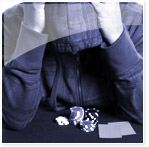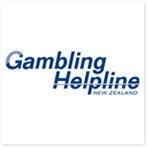Problem Gambling in New Zealand
 In New Zealand, about 80% of adults gamble during their lives. While most of these adults do so as a harmless activity, some make gambling more than just a bit of fun with friends or the occasional purchase of a lottery ticket. When making a bet becomes compulsive rather than a safe activity that individuals choose to do for fun, it's likely that we're dealing with a form of problem gambling.
In New Zealand, about 80% of adults gamble during their lives. While most of these adults do so as a harmless activity, some make gambling more than just a bit of fun with friends or the occasional purchase of a lottery ticket. When making a bet becomes compulsive rather than a safe activity that individuals choose to do for fun, it's likely that we're dealing with a form of problem gambling.
According to studies referenced by the Ministry of Health and the Department of Internal Affairs, it's likely that somewhere between 0.3% and 1.8% of adults living in the community in New Zealand will rate as problem gamblers on standard questionnaires that are designed to assess betting addictions. However, they suspect that the questionnaires understate the problem somewhat, as those who score as having "mild" gambling issues may have legitimate gambling problems as well. The rates for problem gamblers are highest for those who participate in games other than the lottery.
The signs of problem gambling are not always obvious if you don't know what to look for. We want all of our readers to gamble responsibly, and have set up this page to help you understand what constitutes problem gambling and how you might identify it in yourself, a friend, or a family member.
What is Problem Gambling?
According to the Department of Internal Affairs, problem gambling is defined as "gambling that causes or may cause harm to the individual, his or her family, or the wider community." It is often found in gamblers who play pokies and other gaming machines, though any form of wagering can lead to problem gambling.
Similar to problems with alcohol, issues with problem gambling can take many forms. There may be harm that forms from a single gambling session, or from the cumulative effect of many betting sessions over a long period of time. The key is that there are negative consequences to a person's betting habit that go beyond simply losing a reasonable amount of money.
Problem gambling is usually identified by the fact that the gambling activity is disrupting the gambler's life, whether that be damaging to themselves, their family relationships, their work, or in other ways. A compulsive gambler will feel a preoccupation with gambling that doesn't allow them to focus on other areas of their life; instead, they will spend time playing gaming machines or at the casino, chasing losses and feeling as though they can't stop. Even when they do get away from gambling, they may feel irritated when they're not gambling.
Consequences of Gambling Issues
- Financial Trouble: A problem gambler may find themselves spending money they cannot afford, and may accrue debts they cannot pay back. In severe cases, this can lead to bankruptcy or the loss of their home.
- Legal Troubles: Unfortunately, problem gamblers will sometimes resort to illegal means of acquiring more funds to gamble with. These can include theft, fraud, and other means that can result in legal problems for the gambler.
- Family Issues: Problem gambling often causes problems for those around the gambler as well. Family members of those dealing with compulsive gambling are more likely to experience domestic violence or child abuse, and children of compulsive gamblers are more likely to grow up to develop issues with substance abuse or depression. Even in less severe cases, the gambling can put strain on important relationships in the gambler's life.
- Problems at Work: Many gambling addicts suffer from a variety of problems in their workplace. These can range from minor problems with their job performance due to stress or preoccupation with betting, to losing their job or finding ways to steal money from their employers to fund their gambling habit.
Diagnosing Gambling Problems
A professional counselor or psychologist will diagnose a betting problem. But there are a number of warning signs and tests that can be used to gain a clear idea whether you or someone you care about may have a problem, or could be developing one.
One popular diagnostic tool is a series of criteria set up by the American Psychiatric Association. The APA uses a set of ten criteria that can diagnose compulsive or pathological gambling, with a minimum of five criteria needing to be met in order for an individual to be diagnosed as a pathological gambler.
What follows is a list of questions that paraphrases those criteria:
- Does the individual constantly think about gambling?
- Does the individual feel a need to increase their bets to maintain their thrill?
- Does the individual show agitation when they have to cut back on gambling?
- Does the individual gamble as a way to reduce anxiety or escape problems?
- Does the individual chase their losses?
- Does the individual lie to conceal their betting activities?
- Has the individual financed gambling through illegal acts?
- Is the individual jeopardizing significant relationship when they gamble?
- Has the individual relied on financial help from loved ones to meet gambling debts?
- Has the individual failed in previous efforts to limit or stop their betting?
Keep in mind that this questionnaire is not enough to diagnose a gambling problem on its own. A trained physician will diagnose a gambling problem, which will include ruling out other mental health problems as a possible underlying source of the problem gambling behavior. Keep in mind that even those individuals who only answer positively to one or two of the above questions may have a minor or developing gambling problem.
Helping Those With Gambling Problems
There are several ways in which you can help a loved one who you believe may have a gambling problem. In fact, experts believe that the most important thing that family members and friends can do for a loved one who is a problem gambler is to become educated about the problem themselves. This will allow them to learn how to recognize potential issues and understand what the compulsive gambler may be going through.
Once you know that someone you care about has a gambling problem, it's important not to be judgmental when discussing their problem. Instead, attempt to be a part of the recovery process, provided that the gambler wants (or needs) your help. One important thing to consider is that you should never do anything that helps enable their problem gambling. This means that you should not help them pay off gambling debts by offering to pay for them yourself, though you might try to help them find services that can help them better manage their existing debts.
If a friend or loved one is having difficulty accepting that they may have a gambling problem, one method that is used to help those with various addictions and behavioral problems is an intervention. This is a meeting in which loved ones will share stories about how the individual's gambling activities have hurt them or their relationship with the gambler. While interventions aren't generally a way to solve problems, they can help a problem gambler acknowledge a problem and seek help, provided the intervention is done in a loving and positive (yet concerned) atmosphere.
Resources for Problem Gamblers

If you or someone you know is struggling with a gambling problem, there are numerous resources available to help you in New Zealand.
One excellent resource is the Gambling Helpline, which is a national 24-hour freephone support service with gambling problems in New Zealand. The helpline can be reached at the number 0800 654 655. The helpline features specialist lines for a number of different groups that may be at particular risk for problem betting, including a youth gambling helpline, a Maori gambling helpline, and a helpline for debts from betting.
Another resource to consider is a self-exclusion order. These orders allow a gambler to exclude themselves from specific gambling venues in New Zealand. If an individual identifies themselves as a problem gambler, they can be asked to be excluded from gaming floors for up to two years, during which time the casino, or other venue will not be allowed to let them play.
There are many organizations that exist to help with problem gambling, including the following:
Problem Gambling Foundation: Provides free counseling to gamblers, their families, and others affected by problem gambling.
Salvation Army Oasis Centre: Offers free consultations and rehabilitation programmes for those affected by problem gambling, including family members and partners.
Gamblers Anonymous: A support group for gamblers who wish to recover from problem gambling by working together with those who have had similar experiences. GA meets in private groups around the world, including in New Zealand.
More Online Casino Topics:
- Beginners Guide
- Top 10 Tips
- High Roller VIP
- Live casino
- Legislation
- Rules
- Glossary
- Advantages of Online casino
- Understanding Odds
- Guide to Winning
- Bonus Guide



